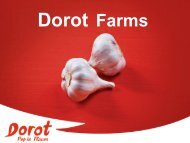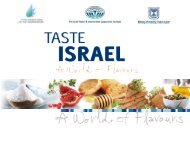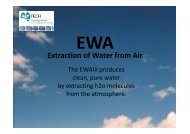PDF file - Israel Trade Commission
PDF file - Israel Trade Commission
PDF file - Israel Trade Commission
Create successful ePaper yourself
Turn your PDF publications into a flip-book with our unique Google optimized e-Paper software.
Agriculture 2011<br />
Sprouting Inhibition of<br />
Postharvest Potatoes<br />
by using Environment<br />
Friendly Mint Essential Oil<br />
Dani Eshel 1 , Paula Teper-Bamnolker<br />
1 , Roi Amitay 2 and Harry<br />
Daniel 2<br />
1. Department of Postharvest<br />
Science, The Volcani Center, Bet<br />
Dagan 50250, <strong>Israel</strong>.<br />
2. Agro-Dan 2008 Ltd, <strong>Israel</strong>.<br />
Fig. 1: Effect of monthly application of mint essential oil (MEO) on<br />
potato tubers from cultivar Belini, stored for 9 months at 10°C.<br />
Fig. 2: Effect of mint essential oil (MEO) thermal fogging on potato<br />
sprouting in storage. Tubers from eight cultivars were stored for<br />
6 months. All tubers were stored at 8°C and 95% humidity and<br />
were thermally fogged monthly with MEO at 100 ml t-1 in the first<br />
application and 30 ml t-1 monthly in subsequent applications.<br />
Dashed line represents the level above which potatoes are no<br />
longer marketable. Error bars represent SE.<br />
Introduction: The potato (Solanum tuberosum L.) is the<br />
highest gross value crop in <strong>Israel</strong> and the world’s largest<br />
food crop in terms of fresh produce after rice and wheat.<br />
Postharvest potatoes suffer from undesirable sprouting<br />
during storage leading to alterations in weight, turgidity,<br />
and texture. Tuber sprouting during storage is caused<br />
by the cessation of natural dormancy of the tuber. Cold<br />
temperature storage (2-4°C) delays sprout development<br />
but does not delay unacceptable tissue sweetening.<br />
Successful long-term storage of potatoes for market,<br />
processing or seed-tubers necessitates using a sprout<br />
control agent in combination with proper management<br />
of storage conditions. Chlorpropham (isopropyl N-[3-<br />
chlorophenyl] carbamate; CIPC) is the most effective<br />
post-harvest sprout inhibitor registered for use in potato<br />
storage, used successfully as a sprout inhibitor for more<br />
than 40 years. It is a mitotic inhibitor that inhibits sprout<br />
development by interfering with cell division and is<br />
effective in long-term sprout control. There have been<br />
reports of residue levels in processed potato products<br />
and both the Environmental Protection Agency (EPA)<br />
and the ”Advisory Committee on Pesticides (APC) in the<br />
UK put new limits on total CIPC application and residue.<br />
Random sampling has shown that there is potential<br />
to exceed the maximum residue limit, even when<br />
applications have been made according to best practice<br />
(http://www.pro-potato.com). For seed-tuber growers,<br />
CIPC residues are problematic in cases where it would<br />
be desirable to rapidly break tuber dormancy. Also,<br />
potato seed-tubers cannot be treated or stored in CIPC<br />
storage facilities, because of the long term negative<br />
effect on field germination. Alternatives to CIPC are also<br />
needed for both the organic and export markets where<br />
CIPC is not permitted or residue level is limited. Due<br />
to increased concern for consumer health and safety,<br />
18
















